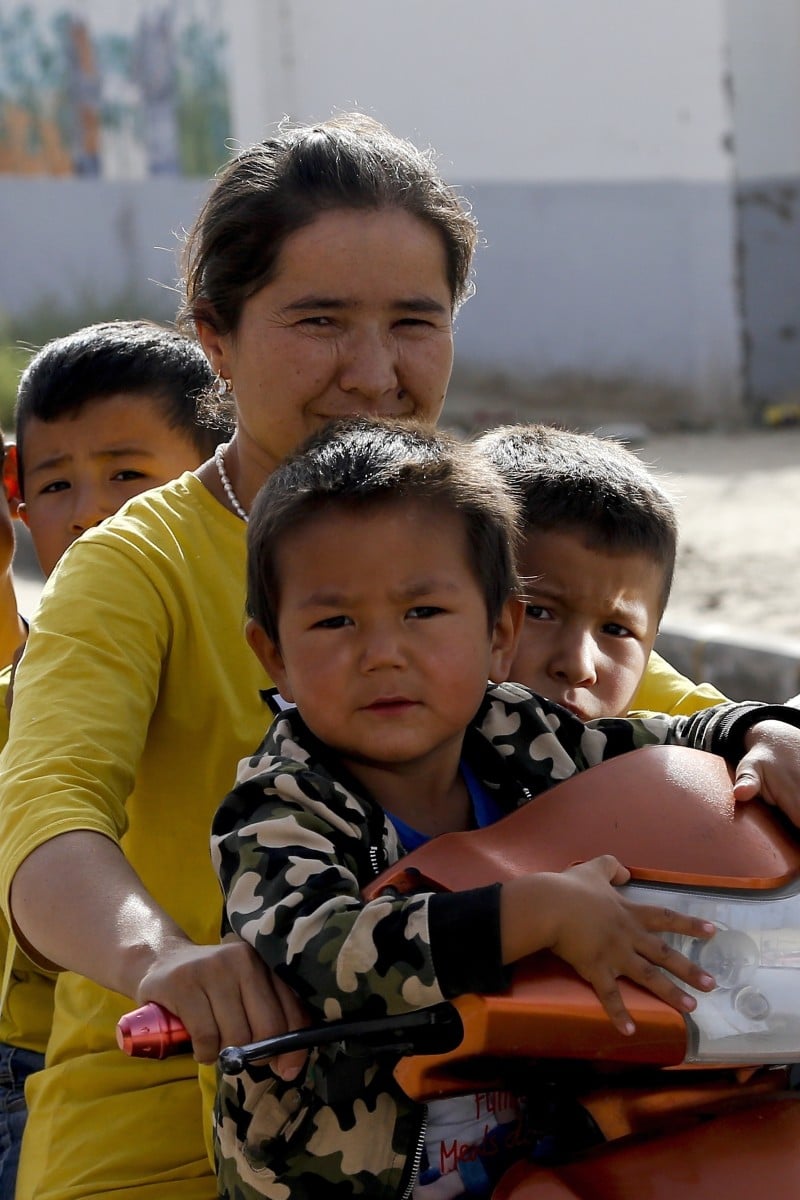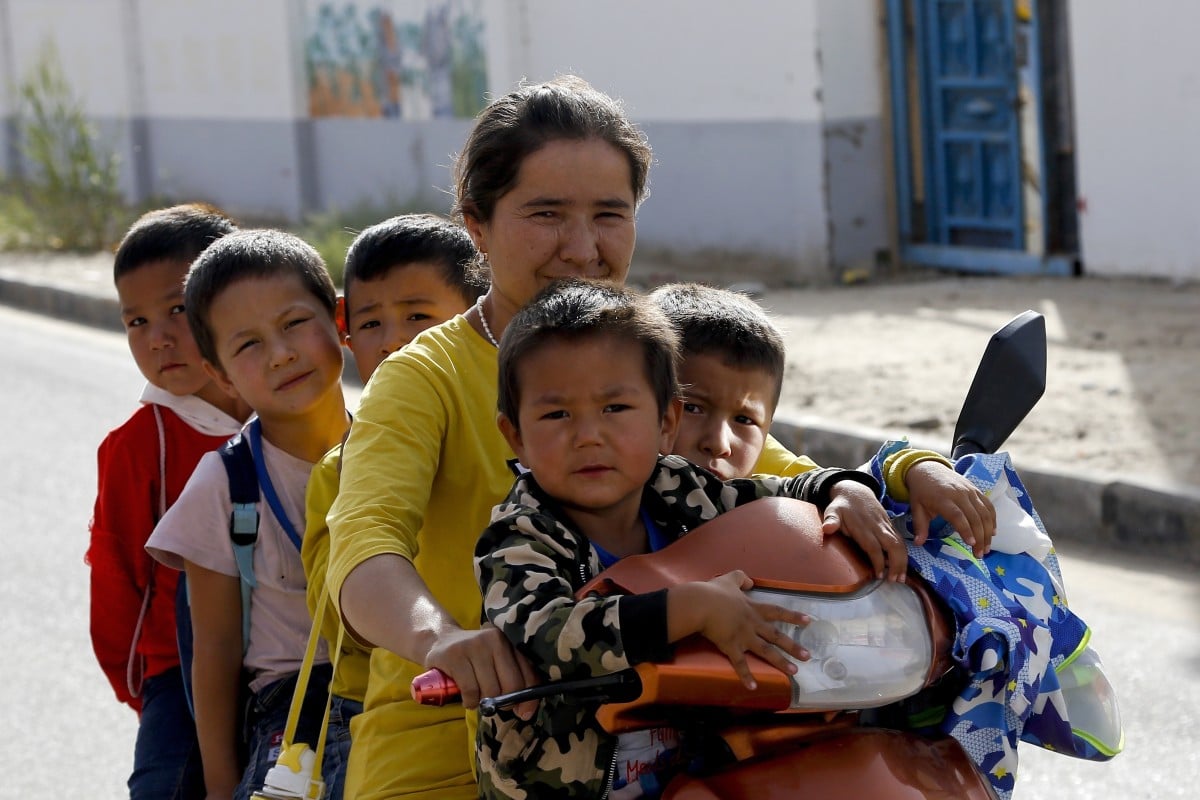
Uygur scholars in China's Xinjiang region being sent to prison or going missing
- At least 435 intellectuals have been imprisoned or forcibly disappeared since April 2017
- Linguists, scholars and publishers who translate between Uygur and Mandarin have been targeted
 China has enacted fierce measures against the Muslim population in Xinjiang, including forcing woman to go on birth control or be sterilised. Photo: AP
China has enacted fierce measures against the Muslim population in Xinjiang, including forcing woman to go on birth control or be sterilised. Photo: APIt has been almost two years since Bugra Arkin’s father Aierken was abruptly snatched from his home in China’s troubled Xinjiang region by national security agents.
Aierken Yibulayin’s publishing firm -- one of the biggest in the region -- translated thousands of books into Uygur before he was detained in October 2018. Arkin has not heard from him since.
“My father had a strong impact on the Uygur publishing industry, and that made him a target of the Chinese government,” said Arkin, who lives in California.
“This is very unacceptable and our lives were literally destroyed.”
He is not the only one.
China forces birth control on Uygur minority in Xinjiang
At least 435 Uygur intellectuals have been imprisoned or forcibly disappeared since April 2017, according to the Uygur Human Rights Project.
The rounding up of Uygur linguists, scholars and publishers is seen by overseas advocacy groups as part of a campaign by the Chinese Communist Party to erase the ethnic group’s identity and culture and assimilate it into the dominant, Mandarin-speaking Han population.
Renowned Uygur linguist Alim Hasani was taken by authorities in August 2018 during a Beijing work trip, according to his son Ershat Alim.
Alim believes that his father, a retired division head of the Xinjiang Ethnic Language Work Committee, was detained for his research, which aimed to standardise Uygur-Han translations.
A a guard tower and barbed wire fence surround a detention facility in the Kunshan Industrial Park in Artux in western China's Xinjiang region. Many Uygurs have been imprisoned in camps like this. Photo: AP
Hasani, who compiled several dictionaries, was a Communist Party member whose projects had previously been approved by the state and won awards.
“When I first heard that my father was arrested, I never once thought that this could happen to him. He must have been very surprised as well,” said Alim, who lives in France.
More than one million Uygurs and other mostly Muslim Turkic-speaking minorities have been held in re-education camps in Xinjiang following a spate of ethnic violence, according to rights groups.
Chinese authorities describe the facilities as vocational education centres where Uygurs learn Mandarin and job skills to steer them away from extremism.
TikTok used by Chinese Uygurs to raise awareness of those detained
In a statement, China’s foreign ministry said: “The so-called notion of ‘imprisoning Uygur intellectuals to extinguish Uygur culture’ is complete rumour-mongering and slander.”
Alim last heard from an acquaintance that his father’s trial, which began in January, had been postponed due to the coronavirus pandemic, but fears he will soon be sentenced and jailed.
His mother, who lives in Xinjiang, “wouldn’t dare talk” about Hasani’s arrest.
“I certainly felt very bad and didn’t know how to express it. For a long time I couldn’t concentrate on my work either,” Alim said.
All 11 linguists in his father’s work unit have also been detained, including 64-year-old Hemdulla Abdurahman, who was snatched in January 2019, according to his son Yashar Hemdulla.
“In March 2019, I was told my father had been taken to a ‘hospital’ ... but the family acquaintance on the call mimed handcuffs on her wrists,” said Hemdulla, who lives in Norway.
“I do not know where he is now.”
Hemdulla knows several intellectuals whose relatives say they were first detained in camps, then given long-term jail sentences, and he is concerned his father might suffer the same fate.
Facebook and Twitter suspend thousands of fake Chinese accounts
Since 2012, bilingual Mandarin-Uygur education has gradually been applied in schools in Xinjiang, with the aim of reaching 2.6 million students.
Prior to that, classes were mostly taught in Uygur and other minority languages.
“By abolishing these textbooks and eliminating Uygur language education altogether, the next generation of Uygur youth will have no way to find their link with Uygur culture,” said Yalqun.
“It is a way for China to eliminate the entire Uygur identity and assimilate them to become... people that speak Chinese, think Chinese and don’t know their own history or culture. That makes me sad and angry at the same time.”